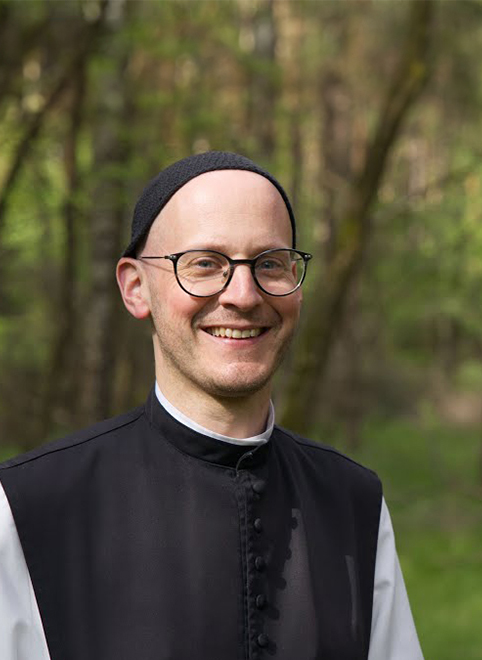Monastery Construction – FAQ
That’s right!
In Neuzelle there is a complete and very beautiful, lavishly restored Cistercian monastery – with everything that goes with it and what monks actually need for their way of life. but the Neuzelle monks today do not have access to it. It was founded over 750 years ago by the then sovereign Margrave Henry the Illustrious and handed over to the Cistercian order along with numerous estates.
The first monks came from the mother monastery in Zella, which was then renamed Altzella. Over the course of many years, the monks and converts built up the brick Gothic monastery of Neuzelle. It was then remodeled into the Baroque and Rococo styles in the 17th and 18th centuries. Finally, in 1806, new choir stalls were installed for 36 monks.
When the Prussian King Frederick William III had the monastery dissolved in 1817 and the monastery estates placed under state administration, the monks had to take off their habit and leave the monastery. The convent had 33 monks at the time, including the last abbot of Neuzelle, Optatus Paul.
Because the Cistercian order, the monks or the church no longer own any of the buildings and land of the old monastery, and have a very restricted use of only a couple of buildings in the whole complex!
The abbey was abolished by the Prussian king over 200 years ago and it was was expropriated from the Cistercian order.
The owner of the monastery complex and around 113 square kilometers of land (forest, fields and water) is now the public-law Landesstiftung Stift Neuzelle, i.e. the state of Brandenburg. It is therefore also responsible for the entire construction of the historic buildings. The Protestant and Catholic churches have rights of useonly for the parish apartments and the two churches in the historic complex and pay an imputed rent for them.
Most of the buildings of the former Cistercian monastery in Neuzelle have been rented out to other users by the state foundation Stift Neuzelle.
- The monks’ former living and working area (cloister) is now a grammar school.
- The cloister is a museum (well worth seeing!) and a venue for cultural events that is offered to the public with revenue from rentals.
- The foundation administration is housed in the former abbot’s rooms and the music school and forestry administration are now located where the estate administration used to be (chancellery building).
- Even the former stables are in use today: The “Himmlisches Theater” museum is located on the ground floor and the boarding school’s living quarters are on the 1st floor.
There are only a few monks left anyway. Surely the space in the Catholic rectory is enough for them?
The space on the first floor of the rectory is currently sufficient for the seven monks. However, it is a new monastery founded in 2018, so there are not “still”, but “already” seven monks, in addition, two more monksare in training at the mother monastery Stift Heiligenkreuz, so when they come visit their convent, or when they finish their studies and return home, there is no space available for them. It also means no one else could join, although there are many vocations flourishing. The young community must be able to grow, and unfortunately that is simply not possible in the rectory.
A proper Cistercian monastery historically consists of at least 12 monks. Heiligenkreuz Abbey, where the Neuzelle monks come from, currently has more than 100 monks.
No, the regular choir prayers will be prayed in the new monastery complex in Treppeln. However, exceptions on special feast days with solemn choir prayer times will also be possible in the Neuzelle collegiate church.
In addition, regular pastoral care will continue to take place in the Neuzelle church and the parish of Eisenhüttenstadt.
The parish of Neuzelle and the pilgrimage will therefore continue to be looked after by the Cistercian monks in the future.
Welcoming guests has been an important pastoral task of monasteries for centuries. The Rule of St. Benedictstates that monks should welcome guests as if it were Christ himself knocking on the door.
But this requires guest rooms, and there are none in the rectory where the monks live currently.
Most people who are interested in staying in a monastery are also looking for a monastic atmosphere, which includes an external sense of calm and a certain degree of integration into the monastic ensemble. After all, you want to be somehow “close” in order to be able to experience everyday monastic life. A monastery shouldand will offer this in the future – at the moment we don’t have the space.
Therefore: Actually yes, you can stay overnight as a guest in a Cistercian monastery – unfortunately not in the Cistercian priory in Neuzelle at the moment. Unless you stay in one of the hotels or guesthouses – but they are not monasteries.

Do you have any other questions that have not been answered here?
Please write to us
If you would like to support us spiritually or materially in this exciting and challenging project…
If you would like to support us spiritually or materially in this exciting and challenging project…
